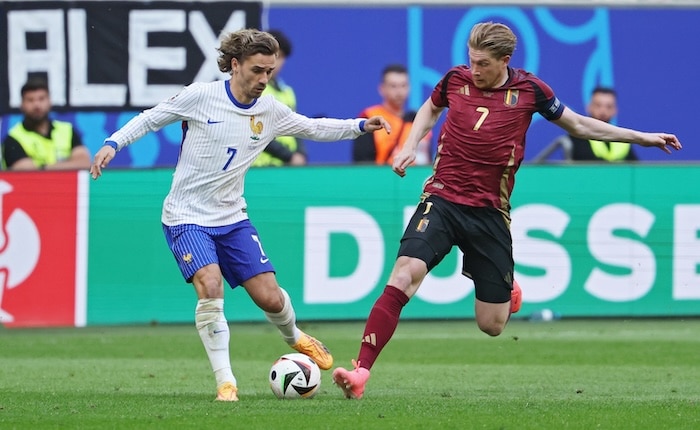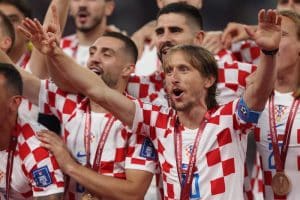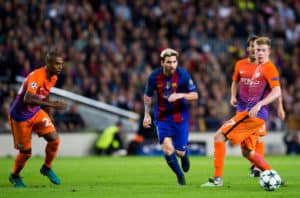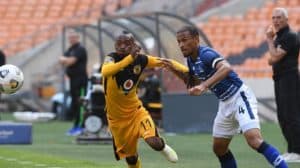He is one of the driving forces on the field because he puts the team’s interest ahead of his own. That is why Antoine Griezmann is the invisible force that propels the French team, writes Mark Gleeson.
There was a moment 10 minutes after half time as France threatened to be overrun by a bravely combative Morocco in their World Cup semifinal in Qatar.
Antoine Griezmann looked worriedly at the bench, seeking the attention of coach Didier Deschamps, because he saw that Theo Hernández was getting into increasing trouble. The left back was faced with an overload on his flank. When the game stopped moments later, he pointed in the direction of Kylian Mbappé and then to the spaces behind him. Didier Deschamps nodded, understood what Griezmann meant and intervened.
Olivier Giroud was taken off, Mbappé switched to the lead striker position and Marcus Thuram brought on as a substitute to assist Hernández on the left flank.
It was a moment that took place out of sight of the cameras but that said a lot about the functioning of Les Bleus. The conversation between Griezmann and coach changed the complexion of the game and France were able to add to their early lead and go on to win 2–0.
Deschamps insists that everything starts from the team idea. It is the common thread in his selection policy and the message that his players hear often. “It’s not about how much applause you get or how fantastic the tricks you show are,” he tells them.
Deschamps wants his players on the field to realise what it takes to win a match and this way of thinking is best symbolised by Griezmann.
Just like at Atlético Madrid, he determines the rhythm of the attacks, slows down the game where necessary and sees when teammates need help.
He is, as the French newspaper Le Figaro headlined during the World Cup: ‘Le vrai chef d’orchestre’ – the true conductor of the orchestra.
“If Antoine has a clear mind and is in good physical condition, there is no player in the world who can understand and interpret football like him,” says Deschamps.
During the World Cup he therefore dared to give him a different, more withdrawn role. Deschamps has worked with Griezmann since 2014 and has never positioned him as far away from the attack as he did during the tournament in Qatar. Owing to the absence of Paul Pogba and N’Golo Kanté, the coach had a problem to solve. He looked for a new balance without sacrificing offensive power.
The solution, he thought, could be Griezmann, as he is a player who thinks about the team interest in all his actions.
And so it proved in Qatar and since … Griezmann is increasingly the ultimate all-rounder. He now spends more time defending than he ever has previously, but remains decisive in attack.
He creates chances for teammates, provides important assists and runs where he is needed most. “In their 30s, the intelligence of great players is measured by their ability to reinvent themselves,” reported the French newspaper Le Monde. “Griezmann has always been a star in the service of the collective. A rare and precious profile.”
Now 33, Griezmann says he is enjoying his new role to the fullest. “I may be less noticed, but I play good matches. I’m not concerned with scoring goals. The team needs me more in the heart of the game, for the movement between defence and attack,” he explains.
Just how important Griezmann is to the side is reflected in his omnipresence.
Since being an unused substitute in a friendly against England on 13 June 2017, Griezmann played in a mind-boggling 84 consecutive matches for his nation, with the run stretching over three major tournaments and over half a decade of unerring consistency. His staggering streak came to an end on 23 March, with a sprained ankle ruling him out of France’s 2–0 friendly loss to Germany in Lyon. 1998 World Cup winner Patrick Vieira was the previous record holder with a paltry 44 matches.
Griezmann’s bond with national coach Deschamps is special, and one the player is very fond of. Check out these great Antoine Griezmann goals for France!
“I owe him a lot,” he explained. “He is the coach who gave me my debut and we have never been apart since. It’s a great relationship.
“I give everything for the shirt, for France, but also for him. I try to do everything I can so that he continues to trust me. Every match, every action, is a thank-you to him.
“The national coach likes to talk to the players. Knowing how we feel is very important to him. He will always try to find the best solution for the balance of the team.”





